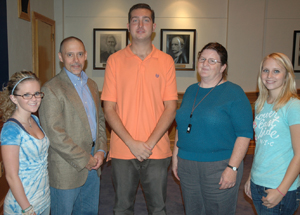The Glenville State College Department of Social Sciences and the West Virginia Zeta Chapter of Pi Gamma Mu, the Social Science Honor Society sponsored the sixth annual Constitution Day Ceremony at the GSC Presidents Auditorium on Tuesday, September 14th. The theme of the 2010 celebration was âThe Constitution at the Community Level.â
Glenville Mayor Tashua Allman was the keynote speaker for the event. Allman graduated from Glenville State College in 2009 with a Bachelor of Arts Degree in History. In June of 2009, at the age of 21, she became the youngest mayor in West Virginia after successful write-in campaign for during the Glenville municipal election. Allman requested a moment of silence be observed for late Senator Robert C. Byrd whoâs 2004 legislation requires all colleges and universities receiving federal money to conduct a Constitution Day event commemorating the signing of the United States Constitution. Throughout his storied career, Byrd was known as a staunch defender of the Constitution. Allman challenged those in attendance to reflect on the many ways that the Constitution affects their lives every day. âThe constitution gives us many rights, including the right to choose our leaders. Each of us should exercise that right and vote in the upcoming election. Every vote counts, especially on the local level. After all, I won the race for mayor by just one vote,â said Allman.

As part of the celebration, a Constitution Day Essay Contest was held for GSC students. Barbara Blankenship of Braxton County, a senior Education major with specializations in Elementary Education and English (K-Adult), took first place honors for her winning essay: For many Americans, the notion of our Constitution focuses mainly on the first ten amendments - the Bill of Rights. Yet, the Constitutionâs true genius lies in the first seven articles, which contain the procedures for establishing the branches of government and defining the relationships between the states and the national government, as well as among the states and localities themselves.
The Constitutionâs framers were deliberately vague, allowing for great flexibility at the State and community level, so that the needs of all of its citizens, whether they live in small, rural hamlets or in great cities with populations in the millions, can be met. One example of the Constitution at the community level is Article IV, Section 4, which requires state [and local] governments to be republics (one person = one vote). What form that government takes is up to the specific community, as long as it is a republic. Article I, section 10, which provides for the common defense is another example. This relieves communities from raising their own military forces and from declaring war. A third example is Article IV, Sections 1 and 2, which requires states to honor the laws of other states and ensures equal treatment for citizens from all states.
Further examples of the Constitution at the community level abound, yet, they all have one thing in common: The procedures outlined in the Constitutionâs first seven articles are what enable communities of any size across our great nation to govern themselves.
Blankinship was awarded a $25 gift certificate to the GSC Bookstore for her winning effort. She was a repeat winner having also won the 2009 contest. In addition, Blankenship was the runner up in the 2008 Constitution Day Essay Contest.
Maria Kisner a sophomore Special Education major from Millstone, West Virginia and Chelsea McEwuen a junior Education major specializing in Social Studies (5-Adult) of Parkersburg, West Virginia shared runner-up honors, and each received a $10 gift certificate to the GSC Bookstore.

